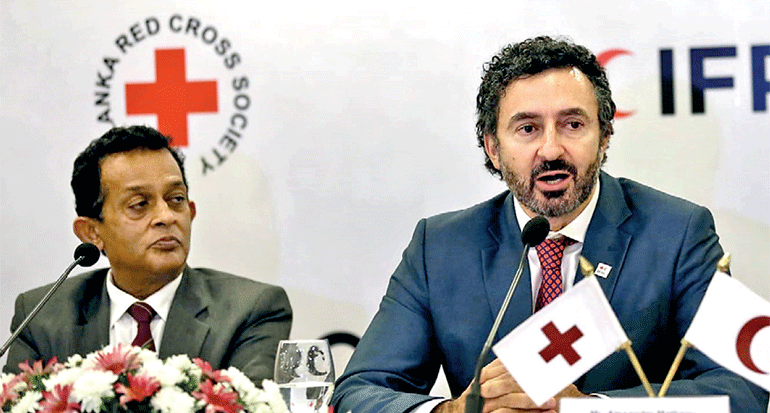Saturday Feb 21, 2026
Saturday Feb 21, 2026
Monday, 17 October 2022 04:10 - - {{hitsCtrl.values.hits}}

International Federation of Red Cross Asia Pacific and Red Crescent Societies Regional Director Alexander Matheou (right) and Sri Lanka Red Cross Society President Jagath Abeysinghe at the press conference - Pic by Ruwan Walpola
By Darshana Abayasingha
The economic crisis has impacted 96% of households with food, health costs and livelihoods at the top of listed concerns, reveals the latest Economic Survey Report released last week by the Sri Lanka Red Cross Society (SLRCS) and the International Federation of Red Cross and Red Crescent Societies (IFRC).
The psychological wellbeing and education of children was also listed as a major priority of concern.
It found that 5.7 million – 26% of the population – require urgent humanitarian assistance and ‘upstream’ interventions. The numbers are very likely to multiply and consequences will depend, the report adds.
The survey conducted by the agencies engaged 2,871 respondents across 11 districts and studied insights on impacts of the current crisis on food security, livelihoods, health and protection.
“Unless critically damaged systems, services and facilities are urgently restored, it is likely that those who are already vulnerable will be pushed further down a pathway to destitution. Households and families across the country are already employing negative coping strategies such as reducing meals, postponing medical care, taking children out of school, and employing children for income, or selling assets,” the report found. The rise of crime and human trafficking was also noted in the report.
Incomes have almost halted in 11% of households surveyed and decreased for 62% following the onset of the economic crisis. Over 85% of households have deployed diverse coping mechanisms, with segments involved in agriculture, fisheries and transportation amongst the worst affected. Four out of five estate households, two-thirds of rural households and half of urban households had moved deeper into debt with the onset of the crisis.
Half of the households surveyed were consuming less animal products, whilst one in ten have completely stopped. One-third of households had reported lack of access to critical medicines, with sections of several vulnerable groups including pregnant mothers experiencing difficulty to travel to obtain medical care.
The SLRCS Economic Survey predicts unsustainable indebtedness to grow, whilst an accumulation of untreated illnesses will result in higher avoidable morbidity and mortality rates. It found that three times more households currently have members wanting to migrate abroad.
The report recommends that support efforts should be integrated as part of a wider coordinated approach targeting vulnerable persons, including urgent provision of food assistance or cash vouchers to address the critical requirements. This could also entail engaging community resources and responses to build resilience and tackle food, health and education shortfalls.